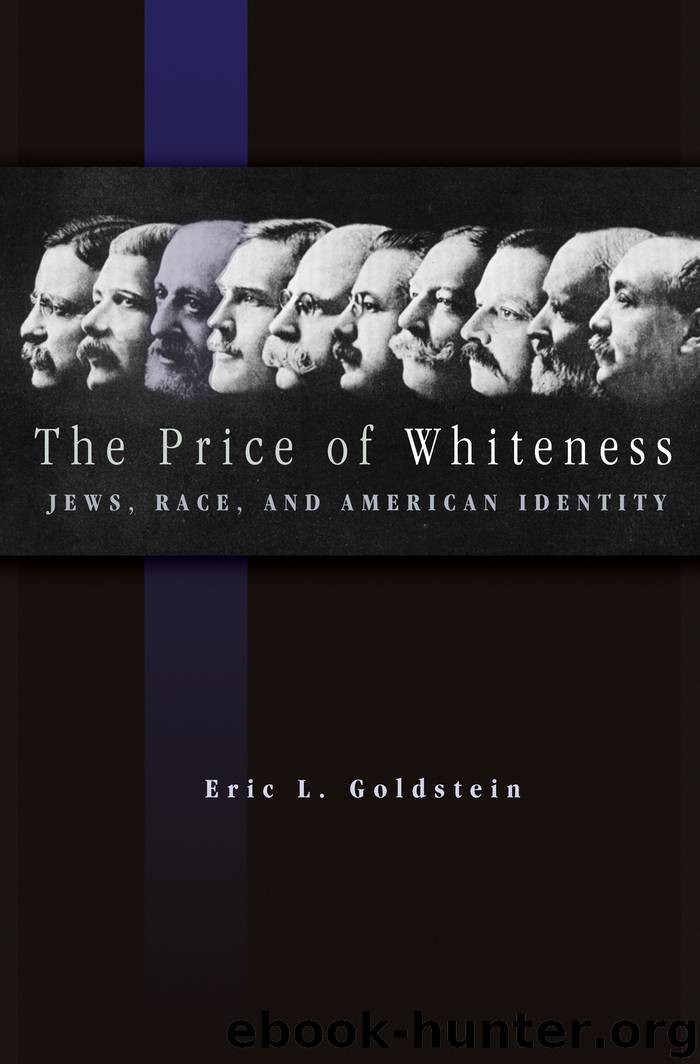The Price of Whiteness by Eric L. Goldstein

Author:Eric L. Goldstein
Language: eng
Format: epub
Publisher: Princeton University Press
Published: 2019-06-18T16:00:00+00:00
CHAPTER 7
WRESTLING WITH RACIAL JEWISHNESS
IN 1922, at the height of the controversy over Jewish admissions to Harvard, Maurice Stern, a Jewish alumnus of the school, wrote to American Jewish Committee chief Louis Marshall to give his opinion on how Jewish leaders ought to approach the matter. Stern was convinced that Jews faced a new type of problem in the Harvard case that had to be answered in a new way. The time had passed when Jews could simply brush off antisemitism by claiming that “religious” discrimination had no place in American life. Stern told Marshall that he, like many acculturated Jews, was used to describing himself as “an American who professes the Jewish faith and worships in a Jewish way.” But Jews now had to admit that something deeper than religious prejudice was at work at Harvard, where professors and administrators suggested the problem was one of “race” rather than religion. American Jews, Stern explained, needed to tackle the matter head on, finally answering the difficult questions about the nature of Jewishness they had long preferred to evade.1
Stern’s letter to Marshall demonstrates the degree to which Jewish racial distinctiveness had come to be seen by American Jews of the interwar period as a “fact” that they could no longer avoid or deny. During this era of “terrible honesty,” when even liberal spokesmen saw the Jews as a problematic group in American society, Jews had little hope of deflecting attention away from their status as a distinct “race.” Rather, they often confronted the “racial” character of Jewishness more directly during these years, discussing it, analyzing it, and interpreting it in the same stark terms as did the non-Jewish public. Fueled by the increased frequency with which white Americans placed Jewish group status under a microscope, Jewish racial consciousness was also encouraged by the changing emotional needs of Jews themselves. As Eastern European Jews and their children became the dominant element in American Jewish life, they proved less willing than their Central European counterparts to use religion as a stand-in for their broader Jewish commitments. Moreover, the mounting sense of social isolation experienced by Jews of both Central and Eastern European background during the 1920s and 1930s made race particularly appealing to both groups as a vehicle for redeeming their sullied image in American society. Just as Jews began to insist on a more distinctive approach to African Americans, they also asserted their own racial distinctiveness with increasing vigor.
The growing tendency of American Jews to describe themselves in racial terms during the 1920s and 1930s, however, was also accompanied by new efforts to justify and legitimize their perceived racial difference. Because American Jews were increasingly native born, they were more conscious than ever of the need to present their group status in ways that did not put their whiteness into question. Unable to deny what was widely seen as the “truth” of Jewish racial difference, Jews during this period tried feverishly to recast the meaning of “race” as it applied to them,
Download
This site does not store any files on its server. We only index and link to content provided by other sites. Please contact the content providers to delete copyright contents if any and email us, we'll remove relevant links or contents immediately.
| General | Discrimination & Racism |
Nudge - Improving Decisions about Health, Wealth, and Happiness by Thaler Sunstein(7706)
The Fire Next Time by James Baldwin(5442)
iGen by Jean M. Twenge(5415)
Adulting by Kelly Williams Brown(4574)
The Sports Rules Book by Human Kinetics(4386)
The Hacking of the American Mind by Robert H. Lustig(4381)
The Ethical Slut by Janet W. Hardy(4251)
Captivate by Vanessa Van Edwards(3839)
Mummy Knew by Lisa James(3691)
In a Sunburned Country by Bill Bryson(3542)
The Worm at the Core by Sheldon Solomon(3487)
Ants Among Elephants by Sujatha Gidla(3467)
The 48 laws of power by Robert Greene & Joost Elffers(3291)
Suicide: A Study in Sociology by Emile Durkheim(3022)
The Slow Fix: Solve Problems, Work Smarter, and Live Better In a World Addicted to Speed by Carl Honore(3009)
The Tipping Point by Malcolm Gladwell(2921)
Humans of New York by Brandon Stanton(2873)
Get What's Yours for Medicare: Maximize Your Coverage, Minimize Your Costs by Philip Moeller(2728)
Handbook of Forensic Sociology and Psychology by Stephen J. Morewitz & Mark L. Goldstein(2704)
